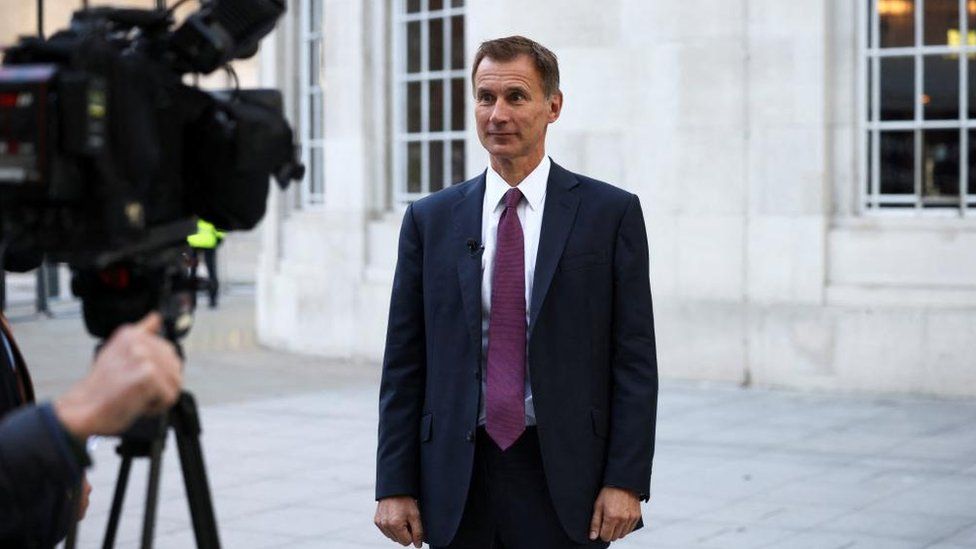
Who is in charge? Liz Truss or Jeremy Hunt?
Who is in charge? Over the last couple of days you'd be forgiven for wondering if anyone was running the country.
The dizzying ups and downs of the mighty financial markets suggest they didn't really have faith that anyone had a grip on things either.
Advertisement
What happens on traders' screens affects the costs we have to grapple with - whether mortgages or rents - and how much of our taxes the government can spend on vital public services rather than paying interest on debt.
Under acute pressure from the markets Prime Minister Liz Truss had a choice - stick with her plan and say goodbye to what economic credibility her government had left - or say farewell to her proposals and try to muddle on.
In other words - change or die. She chose change. But has she killed off what political authority she had left and handed it to someone else?
Jeremy Hunt, her new Chancellor of the Exchequer and a guest on this week's show, has in a little over 24 hours junked her economic strategy of tax cuts and a promise not to cut public spending.
He's made a virtue out of being candid about how bad things are - dangling the implication the prime minister has not levelled with the public about what comes next.
Whether it's intentional or not, the message isn't that subtle: after the craziness of the last few weeks here comes an experienced grown-up to take control.
And it's given the impression, as one former minister put it: "He's gone out and said he's in charge."
Another said Mr Hunt had "dismantled" the prime minister's agenda, while others suggested his arrival leaves Ms Truss in office, but not really in power.
Mr Hunt told me in our interview for Sunday's programme - as you might expect - that she is still the boss.
Yet the way in which he has been able to comprehensively ditch her programme is striking and shifts the political balance in Downing Street.
The hope in No 10 and No 11 is that Mr Hunt's appointment will grant some breathing space to this struggling administration and the financial markets will stop pounding the UK and reserve judgement about the economy's prospects for a fortnight.
Then, on 31 October, the government will be able to spell out how its numbers add up without the need for a magic calculator. But that arithmetic won't be pretty - public spending cuts are on the way and taxes could rise too.
It leaves Ms Truss now technically in charge of a government that is on track to do the opposite of what she originally promised.
She became prime minister by promising the Conservative Party she would cut taxes and shake up what she condemned as boring old Treasury thinking.
But now she can't keep those vows does she still have the right to govern?
One former minister suggested no-one really has legitimacy now: not Ms Truss, nor Mr Hunt.
They are frustrated that Ms Truss has given up on her plans and are suspicious that MPs who were never really on board with her ideology have taken advantage of a crisis in the markets for their own political ends.
One of her fellow free marketeers, an ex-minister, told me they were "discouraged" and warned a "full-scale dismantling of the plans would test party unity in a different way".
In other words, the prime minister can no longer rely on their support.
Does the politicking of the last 48 hours really make that much difference? Believe the polls and Ms Truss' start in office has been an epic disaster from which it is hard to see a return.
For some MPs, whoever is in No 11, the Truss project is over. One former minister said there had been a "total seepage of power and authority" and she is on her way out in either weeks or months.
Another MP said there was no point hanging around: "We need to purge the current incumbents," they said, suggesting it would be a mistake to wait.
"The idea we would lose any credibility we have left by removing her is for the birds because we have no credibility."
It is one of the easiest things in politics to say: "We can't go on like this." And yet, very often, it does.
Boris Johnson and Theresa May survived far, far longer than many of their colleagues had hoped. Disbelief and depression on the Tory backbenches is not the same as there being consensus about who could do the job, or how a replacement would be installed.
There's still reticence about dispatching yet another leader. As one minister said: "We'll look like circus clowns if we change again."
And there's a truth that's been obscured by the wild politics of the last few weeks.
The Conservative Party in 2022 doesn't feel entirely sure what it's for, and hasn't for some time.
On the Tory right some feel an attempt at ditching the rather limp centrist approach of the last few years has crashed - but in the middle there's a sense of grim satisfaction they were correct.
Right now this deeply fragile government may not have time to consider such lofty arguments, let alone settle them.
Their only way out is to try to get a grip.



